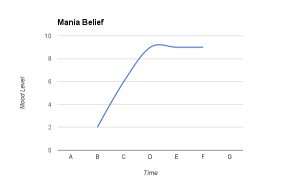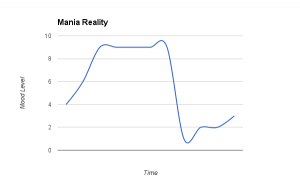I was recently asked if I could find a decent article on the Depression one can experience after a person with Bipolar Disorder crashes out of an escalation. I couldn’t find one that I was satisfied with or that addressed this matter specifically, so here we are.
About the Post-Escalation Crash
Bipolar Disorder is characterized by the mood cycles it gives us. We go up, we go down. Right? Right.
An escalated cycle (mania or hypomania) is like putting our mind into overdrive for as long as we are escalated. Sooner or later, that cycle will end. The Bipolar mind typically snaps back hard into Depression because it has been in such a severe state of overdrive for the duration of that cycle.
How severe is it? Typically, it will be a far worse and deeper depression than we normally experience. In my case specifically, I go from being reasonably intelligent to not being able to do basic math in my head. The thoughts just aren’t there. I never drive in a post-escalation crash period because my mind won’t connect thoughts and actions. As an example…
My mind crashed out of an escalated cycle while driving once. I was escalated one minute and cratered into severe depression the next. I almost ended up rear-ending someone because my brain ceased to do what it is supposed to do. Consider the process required for braking.
1. The person ahead applies brakes and their brake lights come on.
2. Your brain sees the brake lights.
3. Your brain associates the brake lights of the car ahead with a need to stop.
4. Your brain sends the signal to your legs to apply the brake pedal.
That all happens in the span of a second or two. It’s just habit for people that drive on a regular basis.
Now consider what might happen if you insert 3-15 seconds of brain lag between each of those steps with no guarantee that your brain will connect the dots properly. Consider what might happen if your brain doesn’t pull the correct information about the scenario. “What are those lights for?” “I can’t remember which one is the brake pedal!” “That car is slowing down! What do I do?!”
The Difference Between a Crash and a Depressive Cycle
I want to preface this section by noting that this is heavily opinion and theory based on my interpretation of facts. Take it with a grain of salt.
I’ve met many people who feel that this deep crash is another type of cycle. I don’t believe this to be the case and there’s no real support for that belief, that I know of, other than the person having Bipolar Disorder and the low being depression. I don’t believe it to be a cycle of its own because it is often temporary. In most of the examples I’ve seen in myself and in the several people with Bipolar Disorder I interact with on a regular basis, it’s not unusual for the person to crash hard and then float back to their normal.
The crash is just different. It just feels and functions different than what my depression normally gives me. And it does the same thing in numerous other Bipolar people that I’ve been around. It can be frightening and intimidating, which is made worse by the depression, because we’re not used to it.
The other problem is that people who have been dealing with this for a long time often get used to how Bipolar Disorder affects them. “Well, my depression has done this for 30 years. Why would it change now?” It changes because Bipolar Disorder often gets worse with age, so it changes the way things can happen in your brain in addition to whatever other influences are at work such as stress, medication, general life situations, and more.
So, if you haven’t ever experienced it before and you suddenly are, it’s not unusual.
How do we deal with it?
As always, talk to your mental health professionals first and foremost. Communicate with them about what is going on, particularly if it persists for longer than a few weeks. In my personal experience and with other Bipolar people I’ve been around, it usually doesn’t take longer than 2 or 3 weeks to recover. If it takes longer than that, it’s very likely that a medication may need adjusted or added.
The “natural control” crowd often doesn’t want to hear that, particularly if they are in the camp of Bipolar people who aren’t so severe that they can manage with very little medical oversight. But the fallout from this type of cycle can be far, far more severe than what natural management practices can handle.
First, I would recommend revisiting the way that you look at a dominant escalated cycle. A lot of people look at it like this…
When really it looks more like this…
We need to account for he possibility of that extremely deep crash. We need to have a strategy for dealing with that as well.
Rest is an important part of recovery, in my personal experience and with many of the people I interact with on a regular basis. A lot of times I’ll sleep 12-16 hours a day for about a week after I crash and then my brain will rebalance.
Sometimes, patience is the only way you can handle these things.
But, as previously mentioned, involve your mental health professionals as much as possible so they can look at your situation specifically. If it’s lasting more than a couple weeks, we may need a medication adjustment to pull us back towards our normal baseline.
A Theory About Post-Crash Depression and Suicide
Again, pointing out that this is just a theory based on my interpretation of facts and I have no way to substantiate it. I strongly suspect that a post-manic crash is when a majority of suicide attempts driven by Bipolar Disorder occur.
Consider the following.
Ben is well and balanced for years. His body becomes acclimated to the medication and he triggers into a manic cycle that he doesn’t identify because he doesn’t realize that medication efficiency doesn’t last forever. He goes from loving husband and father to manic monster over the course of a couple weeks, unloading verbal and emotional abuse on his family until he finally decides that his family is the source of all of his misery and walks out.
He quits his career, something he went to college for, to pursue his “lifelong dream” of being a rock star even though he hasn’t picked up an instrument in 20 years, shacks up with some random woman he met, files for a divorce, and tears his life to pieces as his brain is screaming through mania.
About a year later, the manic cycle comes screeching to a halt. Ben crashes hard into depression. His mind is no longer plagued by the delusional emotions and thoughts of mania. The love for his family is back, in full force, with the knowledge of what he did to them. Everything he’s built in his career is in shambles. None of the emotions he had for this random woman are present anymore. She becomes collateral damage in the cycle because Ben probably related his delusional thoughts and feelings about his family to her. And many people in her position are convinced by the “passion” and emotional instability a person like Ben is projecting; when in reality he’s just projecting manic delusion.
And he’s in the process of being divorced from the woman he wanted to spend his life with.
On top of all of that, now he has a severe, deep depression which is an entirely new experience; a depression that he is not used to navigating. And Bipolar Disorder, Bipolar-depression, is whispering in his mind on a nearly constant basis about how badly he fucked up. Delusional, incorrect thoughts and feelings plague his mind while he is drowning in the depression with all of the lies it likes to tell us. “It’s hopeless, it’s pointless. You’ve lost everything. You’ll never be able to fix this.”
What’s left for Ben? He’s burned the bridges to the people he cares about. Hopefully, he would reach out to an emergency service or his doctor. But I’m certain plenty of people do not. I think that this time period, when a Bipolar person swaps from the “invincibility” of mania to the most fragile emotional state we will ever experience, is the most likely time that we will decide we’re done with this ride.
What can we do about it?
The only solution I can think of is to plant a seed that will hopefully blossom after they crash. I would say something to the effect of, “If ever there comes a time when you realize how awful you’ve been acting, please reach out to me so we can get you help.” And that may be a real hard thing to do with someone whose brain is screaming through insanity with all of the chaos and misery that goes along with it. Hopefully, they will remember that when their brain finally crashes out and know that they can reach out instead of seeing suicide as the only option left.
That does not mean you make them promises or welcome them back with open arms or anything. Every situation is different. Every person has limits on what they are able to deal with. But, many of the people that are faced with this decision are sons, daughters, mothers, fathers, spouses; and so on. It could be the difference between just a serious life change versus needing to explain to the kids why their parent is gone. And if they do reach out, get them in touch with an organization that can help at-risk, in-crisis people that serves your area. In the United States that would be the National Suicide Crisis LifeLine 800-273-TALK (8255) and their site also has a chat contact option, which may be good for some.
How will I know if a toxic person is just trying to manipulate me?
Given that most of the people dealing with this will know the Bipolar person very well personally, you’ll know. It’s a night and day difference. Just pay attention to ensure they are acting on trying to get help. Don’t promise that they can come home or that there won’t be repercussions. Don’t promise to forgive and definitely don’t forget. Just focus on getting that person in contact with people that can help them.
And finally…
I want to take a final moment to point out that this article specifically points at a dominant escalated cycle and the subsequent ending of it, not general instability or Rapid Cycling. I’ve known Bipolar people who never really had extremely deep lows and highs. This information may not be 100% applicable to each of us specifically. Nothing is when you’re dealing with mental illness. If you’re in doubt, talk to your mental health professional. If this resonates with you, feel free to let your professional read this, get their thoughts on it, and develop a strategy for dealing with it that makes sense for YOU.
Subscribe to have blog posts and news delivered straight to your Inbox!

